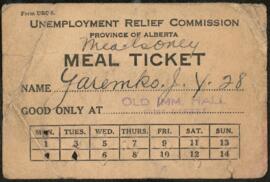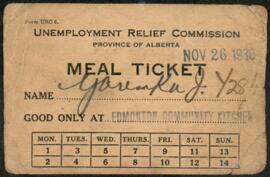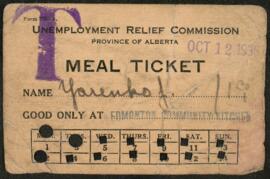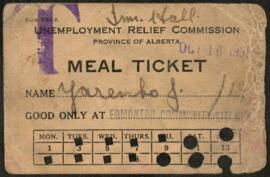Museum booklets and leaflets (from Svidnik Museum and others), newspaper clippings and papers on the Carpatho-Rusyn issues, some personal notes, scholarly papers of different authors in the Polish language about Ukrainian culture, border culture, the 'Wisla' operation, "Encyclopedia of Ukraine" booklet, and copies of the following brochures:
- Кубійович Володимир. Мої друзі, співробітники, колеги. Відбитка з "Сучасности", 1983.
- Петришин М. Будують чи руйнують? З приводу діяльности огранізації українських націоналістів. Видавництво "Пролом", 1932.
- Крапка над і. Відкритий лист з приводу так званого "закордонного представництва" Петра Григоренка/ Dotting the i. An open letter on the occasion of the so-called 'western representation' of Petro Hryhorenko. Anabasis, 1980.
- The letter from Mykola Lebid' to the State Secretary George C. Marshall. September 18, 1947 (German language)
- UPA-departments escaped from Ukraine to the US-zones in Austria and Germany. BY UHWR. October, 1947. (German language)
- The letter to the editorial office of "Ukrainian Tribune". München, September 26, 1947. (German language)
Klid discusses medical books, Ukrainian interment camps, and the Education Foundation.
This item contains a recording of a meeting. Items discussed included: course offerings and attracting students. Ukrainian course + one suitable for the Women’s Studies. With funding, a specialist in Siberia from Calgary could come and teach - Department of Northern Affairs might be interested in it. Also discussed a need for establishing the Standing and Ad Hoc Committee. Financial and Budget Committee doing space allocation and money allocation – under the jurisdiction of the Head of
the Department. Discussing equipment matters.
This item is a recording from Banff conference of CEESSA
(Session #18): Chairman is [Andre] Tari
Only 2 sessions were allocated for the community topic
Mrs. Pelech talking about Sunday school
[Czartoryski?] talking about cultural heritage
Duska speaking about educational needs
Dudaravicius talking about identity
Dudaravicious’ presentation: identity as subjective sense of belonging in groups. Canadian identity is multiculturalism. Forcing immigrants to conform to the Anglo-Saxon or French identities., to forget their mother tongue and dances.
Mrs. Pelech: Saturday schools get grants. They are needed to preserve cultural group’s true history and provide information about it. Participants of those schools need pride and motivation. There are people-parasites who are not interested in anything except pleasures. Regular school and Saturday one compliment each other and does not compete. They teach respect to ethno-cultural heritage and be proud of it; they motivate youth for a healthy life outlook. Media and parents do not anymore encourage to learn. Edmonton school board is cooperative. Recommendation for the UofA to prepare teachers for language classes, especially in native languages. Languages should be compulsory at the university level.
Mr. Duska: Teaching our young people respect for their cultural heritage will help them respect other Canadians. We should keep children busy learning and off the streets. There is no single program at Canadian universities for Hungarian studies. Provincial governments refused to help. There was a suggestion to establish an endowment fund. Hungarians campaign to promote own language/culture at a university level.
Mr. [Czartoryski?], Executive Director of CEESSA, talking about maintaining cultural heritage. Academics, people with higher education have an obligation to go back to the communities and help with higher level of education. Academics are often accused by the community members. 30% of Alberta population are of East European background. Canadian schools struggle to develop in their students certain values.
Session 2:
Panelists: Dr. Chandler; Don [Benge] from Saskatchewan, Director of the Curriculum of the Edmonton Public School Board; Don Massey; Arthur Levin; Dean Lock; Mrs. Lobay
Dr. Chandler: Department of Education develops programs but does not build the books, about ethnic groups in particular. CEESSA’s objectives and the Department of Education’s objective can coincide and they can help each other with regards to the materials that are down to the level of the elementary children. The nature of multicultural education is beneficial and enriching for everyone. Opportunities in the curriculum for ethnic studies: good balance between Canadian studies and global studies, studies of the past and contemporary studies. Curriculum becomes more compulsory if certain goals are specifically identified. Tentative outline: grade 1 program about family should look at families of different ethnic backgrounds; grade 2 – groups that influence you. Should include what children should learn about various ethnic groups; grade 3 – communities; should take a look at communities with different ethnic cultures within Canada; grade 5 – Canada as a whole, should look at immigration and settlement in Canada; grade 7 – study of cultures in general, should look at native people in Canada and their relationship to the multicultural nature of Canada; grade 8 – study of developing nations in the World, should look at immigration policy of Canada; grade 10 – study of Canadian economic and political problems, should look at how multiculturalism adds to national unity. A Committee set up to develop materials for the program, and CEESSA should contact the Committee.
A motion to form a National Society
This item is an audio file containing the very last moment of Mr. Schmid's address, applause , and Mr. Agust Osis- his common prayer concludes the conference of CEESSA of 1977.



